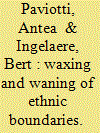| Srl | Item |
| 1 |
ID:
092171


|
|
|
|
|
| Publication |
2009.
|
| Summary/Abstract |
The modernised tradition of the Gacaca courts has become the key mechanism for dealing with the past in Rwanda. The process needs to establish accountability for all acts of genocide and to foster reconciliation. Nevertheless, popular narratives and survey results reveal that a widespread 'crisis' accompanied the initial stages of the Gacaca process. We argue that a problematic quest for the truth is short-circuiting reconciliation in post-genocide Rwanda. Truth-telling is the cornerstone of the transitional justice framework due to the design of the Gacaca tribunals. On the basis of twenty months of fieldwork in Rwandan villages, we locate tensions at different levels. The Gacaca system is a distinctively modern phenomenon despite its traditional appearance. The state-sanctioned speaking of the truth according to a prosecutorial logic runs counter to the core values of the customary institution and established societal practices. This friction is further enhanced by the underlying Judeo-Christian model of truth-telling introduced with the Gacaca system in a socio-political environment mediated by a culture of deceit and dominated by a war victor. In such a socio-cultural context, communication serves the interests of the power holders (national and local), and not necessarily the interest of truth-telling and justice.
|
|
|
|
|
|
|
|
|
|
|
|
|
|
|
|
| 2 |
ID:
094927


|
|
|
|
|
| Publication |
2010.
|
| Summary/Abstract |
This article analyses over 400 life trajectories of ordinary peasants in order to complement top-down studies of the Rwandan political transition. Changes and differences according to the ethnicity of the respondents shed light on the Hutu-Tutsi bi-polarity which underlies the transition and reveal a reversal in perceived ethnic dominance accompanying the decisive moment in the political transition: the overthrow of the Hutu-dominated regime by the Tutsi-led RPF. This suggests that the experience of the nature of governance and the (perceived) proximity to power lies at the heart of ethnic awareness. The nature of governance at the periphery of society is explored, and the article demonstrates that the instrumental stance on ethnic identity adopted by the post-genocide regime is not only erroneous but counter-productive. Adjusting the socio-political environment in which identities thrive is more important than a direct focus on identity constructs when developing policies to prevent ethnically structured violence.
|
|
|
|
|
|
|
|
|
|
|
|
|
|
|
|
| 3 |
ID:
173209


|
|
|
|
|
| Summary/Abstract |
We study changes in inter- and intra-ethnic trust in Rwanda. We focus on the impact of the 1994 genocide against Tutsi, which is a case of group-selective violence marked by a clear perpetrator-group and victim-group as well as within-group variation with respect to exposure to violence. In our empirical analysis, we rely on more than 400 individual life histories in which intra- and inter-ethnic trust were systematically ranked for all life history years. Overall, we find that, while intra-ethnic trust remains largely unchanged, inter-ethnic trust decreases with the onset of violence and sharply so for those targeted in the genocide. Inter-ethnic trust gradually recovers over time. Only members of a subset of the victim-group, namely those with the highest probability of individual physical exposure to violence, portray signs of continued out-group mistrust, 17 years after the genocide. Our results suggest that taking into account the element of time, establishing a fine-grained differentiation of the relevant in- and out-groups in the conflict, and identifying the level of exposure to violence, are necessary steps to better understand the impact of political violence on trust. Regarding theory, our findings further qualify what is known about the twofold theoretical foundation of trust relationships, namely that changes in interpersonal trust reside in altered personal predispositions due to traumatic experiences and/or evolving experiences of trustworthiness in social interaction.
|
|
|
|
|
|
|
|
|
|
|
|
|
|
|
|
| 4 |
ID:
191859


|
|
|
|
|
| Summary/Abstract |
Violence based on identity constructs reinforces the experience of ethnic boundaries as felt distance between in-groups and out-groups. But what makes such an experience of rigid ethnic boundaries fade or disappear, if anything? We examined this in Burundi, a country characterised by repeated episodes of violence between Hutu and Tutsi since independence. We analysed the waxing and waning of ethnic boundaries through the (life) stories of 202 individuals collected through an iterative research process in two rural villages that were seriously touched by (ethnic) violence. Rigid boundaries between ethnic in- and out-group appeared to fade through non-violent interactions; when categorisations other than ethnic emerged; and when awareness of interstitiality, being in-between salient groups, contested the relevance and meaning of the ethnic boundary as such. These insights invite us to bring in multiple temporalities and identities when aiming to understand legacies of violence in conflict-affected societies such as Burundi. This would allow us to avoid treating groups as substantial entities, which reinforces boundaries between in-groups and out-groups.
|
|
|
|
|
|
|
|
|
|
|
|
|
|
|
|